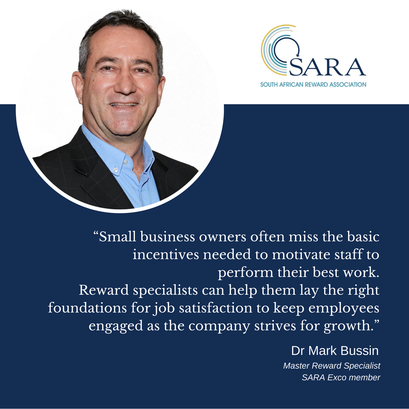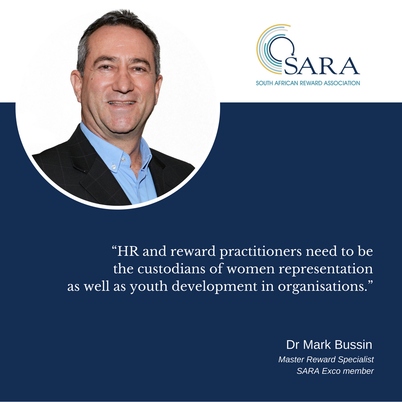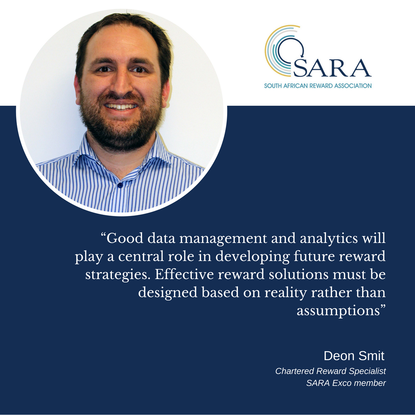|
The country’s celebration of a welcome change in leadership was quickly followed by an upbeat State of the Nation Address from newly-elected President Cyril Ramaphosa. Acknowledging that South Africa’s economy will be sustained by small businesses, the President stated that it is “our shared responsibility to grow this vital sector.” In a closing reference to Hugh Masekela’s song “Thuma Mina”, he concluded: “Now is the time to lend a hand. Now is the time for each of us to say ‘send me’.”
The reward practitioner's role Dr Mark Bussin, Master Reward Specialist, Executive Committee Member of SARA (South African Reward Association) and Chair of 21st Century agrees completely. “There is a definite opportunity for reward practitioners to play a role and lend a hand to small businesses,” he says. According to Dr Bussin, SARA members are typically employed by large corporations, but can still do their part by offering free advice and services to small business managers and startup entrepreneurs. “We may have family, friends or acquaintances who run or are starting their own business, and who employ several workers. This is a great opportunity to contribute to their growth because at that level, not many consider the productivity fostered by a solid reward structure.” Introducing reward to small business Small business owners are often completely focused on operations, finances, marketing and sales but miss the basic incentives needed to motivate staff to perform their best work. Reward specialists can help them lay the right foundations for job satisfaction to keep employees engaged as the company strives for growth. Dr Bussin mentions several elements that must be in place from the start: “If these are cobbled together too late, only after dissatisfaction arises, employers could find their business suddenly struggling as their top workers exit.” His points include being clear on job descriptions and their responsibilities; establishing who reports to whom; defining pay scales with minimum and maximum limits; ensuring meticulous tax administration; documenting the rules governing bonus schemes; clarifying if employees have ownership in the company or not; having employment contracts that respect the law; and developing clear recognition schemes and promotion paths. While small businesses are usually not capable of offering extended non-financial rewards, they should start planning for a time of growth when development, training, a pleasant work environment, wellness programmes and other incentive schemes become more important to attracting and retaining valuable talent. How big businesses can help Dr Bussin also strongly encourages large organisations to become involved in such initiatives rather than discouraging them. “Every corporation should identify several small business candidates and lend out their reward practitioners for free for an hour or two a week as part of their CSI projects,” he says. “Just doing this, they too could make a significant contribution to the economy.” Small businesses face many challenges getting off the ground and surviving their first five years. Reward professionals can answer the call of “send me” by helping them build a motivated, loyal workforce to add greater assurance of their success, especially when the going gets tough. ENDS MEDIA CONTACT: Juanita Vorster, 079 523 8374, [email protected], www.atthatpoint.co.za For more information on SARA please visit: Website: www.sara.co.za Twitter: @SA_reward LinkedIn: South African Reward Association Facebook: SARA – South African Reward Association
0 Comments
The prosperity and equality of the nation’s workforce – alluded to in the recent State of the Nation address by President Ramaphosa – is in large part determined by reward practitioners: professionals that advise companies on how to structure financial and non-financial pay elements to compensate employees for their work.
“Inequality was mentioned at least ten times during the address,” says Dr Mark Bussin, a Master Reward Specialist, Exco member of the South African Reward Association (SARA) and Chairperson of 21st Century. “Reward practitioners must take this seriously in their practices and policies by reporting the wage gap in annual financial statements, and finding ways to close the wage gap in companies.” Tough calls for private sector reward practitioners Reward and HR practitioners also need to step up their focus on training and education. Tough calls are necessary on employing more people through internships, and creating entrepreneurs within companies. Tougher yet will be the decision to release these successful candidates to industry in order to let the larger economy benefit from the initial training and development investment. Tough calls for public sector reward practitioners HR and reward practitioners in government will be tasked with cutting costs, cutting pay increases, and managing fruitless and wasteful expenditure across the public sector workforce. “Reward practitioners need to be steady, well informed and consistent in their approach,” says Bussin. “They also need to stand up to those that resist changes for the greater good, as well as new leaders who want sweeping changes just for the sake of it.” Tough calls for individual practitioners HR and reward practitioners furthermore need to be the custodians of women representation as well as youth development in organisations. Bussin advises reward practitioners to follow national policy in all areas including benefits, working conditions and employment practices. Reward practitioners will also have the added challenge of supporting government and business in creating increased remuneration for 6 million people. The implication of this is that practitioners focus on getting their remuneration governance right and working without any further delay. “As per our President’s closing words, all reward practitioners have a chance to make a difference right where they are by moving beyond historic practices and being willing to say “send me” to do the tough work where it is necessary.” ENDS MEDIA CONTACT: Juanita Vorster, 079 523 8374, [email protected] For more information on SARA please visit: Website: www.sara.co.za Twitter: @SA_reward LinkedIn: South African Reward Association Facebook: SARA – South African Reward Association Companies usually base how they pay and reward their employees on financial data. Deon Smit, Chartered Reward Specialist and Executive Committee Member at the South African Reward Association (SARA), says that corporate communications like emails or instant messages, social media posts and many other data sources should be used to provide deeper insights.
These insights can help to keep financial and non-financial elements of remuneration relevant to what employees need as motivation. “Good data management and analytics will play a central role in developing future reward strategies. Effective reward solutions must be designed based on reality rather than assumptions,” says Smit. “Reward practitioners must start taking responsibility to gather the right information and develop the ability to draw valid conclusions from the data available.” Smit offers the following practical guidance: Start with a purpose It’s important to decide what business problems should be solved first and what data is best suited to that purpose. “Tackle the simple business problems first and build up to the big ones,” advises Smit. “This will help you get your data and your process right at each discrete level of growing complexity.” HR and people data will be central to efforts, but strategic, financial, and corporate communications data will also play an important role. Be a visionary For most problems, a large set of historical data is needed to facilitate predictive analysis and produce accurate results. “You have to decide what you want to measure in 6 months from now, build the datasets and make sure the data is accurately captured,” says Smit. “Only after that period will you have enough to work with.” Clean up “One of the first mistakes companies make is to start with incomplete, incompatible or mismatched data,” reports Smit. The data collection methodology employed must be consistent to ensure there are no information gaps that could produce misleading results. Learn Reward practitioners should understand how datasets are constructed, how relational databases work and how unstructured data found in emails, social posts and other digital sources can be collected. They also need to evolve past Excel and embrace programming languages like R (a statistical language), Python (a general programming language) or SQL (a database query language). In addition, business intelligence and data analysis skills are essential. This may seem unnecessary for reward programmes but Smit foresees that these competencies will be in demand in the future. “HR will start hiring data specialists over people specialists because data will become the key to understanding workforce behaviours and motivators,” says Smit. He suggests that practitioners become self-educated to increase their value. Universities now offer numerous free courses on these subjects through MOOC (massive open online courses) platforms. Don’t forget qualitative inputs Although quantitative analysis - mathematical and statistical modelling - is critical, reward specialists should not overlook qualitative analysis - the study of observable behaviour or structure. “Don’t become too focused on the numbers,” recommends Smit. “They need to be viewed in conjunction with phenomena like group dynamics, behavioural psychology, generational concerns, cultural norms and other non-numerical inputs.” Start over Data analysis must always solve a business problem. Once the collected information has been studied and understood, reward specialists can develop innovative solutions and drive their implementation forward. Smit concludes: “After a solution has been found, the cycle will start over so that another – more complex – business problem can be targeted.” ENDS MEDIA CONTACT: Juanita Vorster, 079 523 8374, [email protected], www.atthatpoint.co.za For more information on SARA please visit: Website: www.sara.co.za Twitter: @SA_reward LinkedIn: South African Reward Association Facebook: SARA – South African Reward Association |
Archives
March 2023
Welcome to the South African Reward Association newsroom.
Categories
All
|




 RSS Feed
RSS Feed